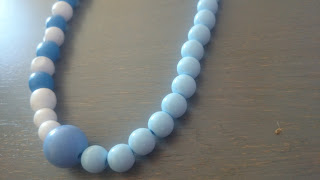Individuals who suffer from mental or neuropsychological disorders often tend to neglect their appearance and look unattended- and they could even neglect their personal hygiene.
Especially when it comes to dementia, aside from the symptomatology that prevents the person from 'looking good', other factors such as age or social convictions play a role.
Urging an individual with dementia to become more into their hygiene and looks is not easy, especially in cases where the person does not understand why, or how to do so.
Maintaining the personal style is also an important issue in dementia. Having the person picking his/ her own outfits and wearing their old clothes might contribute to them maintaining a stronger sense of self, which due to the disorder is diminishing.
With that in mind, in an individual session with an elderly lady with dementia, she was asked to create a necklace for herself. She used to work in the fashion industry, loved clothing, and was quite a coquette back in her day. In fact, her caregivers (family members and nursing home stuff) have ensured that she still dresses up nicely and even sometimes wears jewelry. Thus, she was asked to make a necklace in order to both experience the benefits of the process (exercise the mind and fine motor skills, and have fun) and to have a reminiscence of her work, through wearing it, which would ultimately make her look more elegant.

The procedure was simple: beads were passed through a thread, which was ultimately tied in a knot. She started off with a little help, but as soon as she got used to the process she did the rest entirely on her own. Since she was involved in fashion, she was accustomed to and enjoys using relevant material, such as beads, threads or fabrics.
When the necklace was complete, the lady smile and said: 'Did I just make that?', then she proudly put it around her neck. Now every time she wears it, her work is being commented upon; she is reminded that she made it, along with complements. Still, a few weeks later, it makes her happy every time!
Note: The current activity was conducted in an individual level in the sphere of creative work and cognitive reinforcement in a specific elderly care unit in Athens.





Δεν υπάρχουν σχόλια:
Δημοσίευση σχολίου